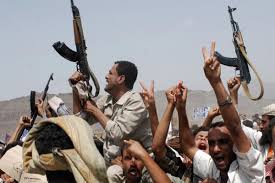War and rumors of wars: number of armed conflicts increased strongly in 2011 says new report
Posted by The Extinction Protocol
 July 13, 2012 – WORLD - Last year, the number of armed conflicts in the world increased markedly, with the strongest increase taking place in Sub-Saharan Africa. This is the conclusion in a new report by researchers at the Uppsala Conflict Data Program (UCDP), published in the Journal of Peace Research. UN Secretary-General Ban Ki-Moon has presented the statistics to the UN General Assembly in his report on international mediation. Following a year (2010) that signaled hope for a more peaceful development, the number of conflicts increased by nearly 20 percent, from 31 to 37. Last year’s jump in conflicts deviates from the long-term trend line, which shows that the world is gradually becoming more peaceful. “It should be pointed out, however, that even though we have now witnessed the largest increase between any two years since 1990, the number of conflicts is still far below the peak levels of the early 1990s,” says Professor Peter Wallensteen, head of the UCDP. At the peak 53 armed conflicts were active. 2011 also saw an increase in the most severe conflicts. Six conflicts were categorized as wars, passing the level of at least 1,000 battle-related deaths. This is up from four in 2010. While the wars in Afghanistan, Libya, Pakistan, and Somalia have received much media attention, the intense conflicts in Sudan and Yemen have been less covered. “The increase in the category of the most deadly conflicts is disquieting,” says Lotta Themnér, project leader at UCDP. The growth in conflicts is not primarily a reflection of the Arab Spring. Only in Libya and Syria did the unrest develop into organized armed conflicts. The strongest growth has happened in Sub-Saharan Africa, in the shade of the Arab Spring events. Armed conflicts in Sub-Saharan Africa have increased by 50 % in only one year, from 10 in 2010 to 15 in 2011. – This is a grave development for a region that desperately needs stability and development, says Helge Holtermann, PRIO researcher and Managing Editor of the Journal of Peace Research. The partition of Sudan has caused new conflicts, while former conflicts in Nigeria and Senegal have reemerged. –Physics
July 13, 2012 – WORLD - Last year, the number of armed conflicts in the world increased markedly, with the strongest increase taking place in Sub-Saharan Africa. This is the conclusion in a new report by researchers at the Uppsala Conflict Data Program (UCDP), published in the Journal of Peace Research. UN Secretary-General Ban Ki-Moon has presented the statistics to the UN General Assembly in his report on international mediation. Following a year (2010) that signaled hope for a more peaceful development, the number of conflicts increased by nearly 20 percent, from 31 to 37. Last year’s jump in conflicts deviates from the long-term trend line, which shows that the world is gradually becoming more peaceful. “It should be pointed out, however, that even though we have now witnessed the largest increase between any two years since 1990, the number of conflicts is still far below the peak levels of the early 1990s,” says Professor Peter Wallensteen, head of the UCDP. At the peak 53 armed conflicts were active. 2011 also saw an increase in the most severe conflicts. Six conflicts were categorized as wars, passing the level of at least 1,000 battle-related deaths. This is up from four in 2010. While the wars in Afghanistan, Libya, Pakistan, and Somalia have received much media attention, the intense conflicts in Sudan and Yemen have been less covered. “The increase in the category of the most deadly conflicts is disquieting,” says Lotta Themnér, project leader at UCDP. The growth in conflicts is not primarily a reflection of the Arab Spring. Only in Libya and Syria did the unrest develop into organized armed conflicts. The strongest growth has happened in Sub-Saharan Africa, in the shade of the Arab Spring events. Armed conflicts in Sub-Saharan Africa have increased by 50 % in only one year, from 10 in 2010 to 15 in 2011. – This is a grave development for a region that desperately needs stability and development, says Helge Holtermann, PRIO researcher and Managing Editor of the Journal of Peace Research. The partition of Sudan has caused new conflicts, while former conflicts in Nigeria and Senegal have reemerged. –Physics